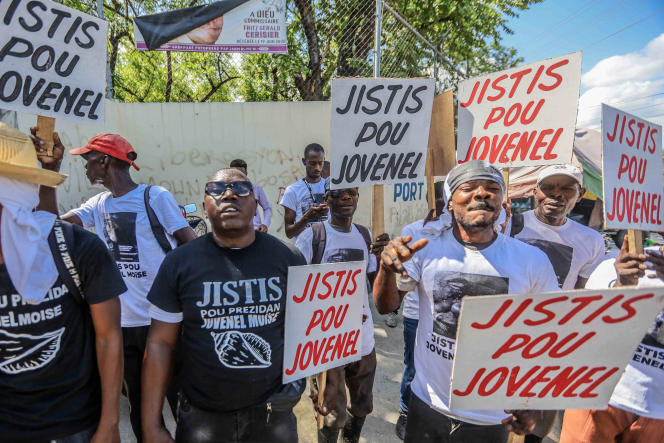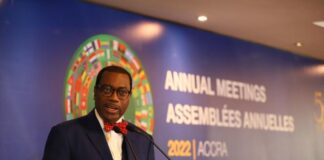A mausoleum for the late president: it is by the inauguration of a funeral monument in the gardens of the Haitian National Pantheon Museum, in Port-au-Prince, that the Haitian government was to commemorate, Thursday, July 7, the first anniversary of the assassination of Jovenel Moïse. The tomb must accommodate the remains of the Head of State, shot by a dozen bullets by a commando, at his home in Pétion-Ville, in the suburbs of the Haitian capital, on the night of July 6 to 7, 2021. Two weeks after the attack, the president, elected in February 2017, was buried during a national funeral in Cap-Haitien, the northern metropolis, where he was from.
The solemn commemoration of this sinister anniversary risks being overshadowed by many false notes. The president’s widow curtly declined the invitation of Prime Minister Ariel Henry, who came to power a few days after the fatal attack and is now alone at the head of the executive. “The Moïse family does not intend, under any circumstances, to attend the commemorative activities supported by the Haitian State,” replied, in a press release, the communication office of the former first lady, who had been seriously injured during of the attack. “The judicial investigation is floundering,” laments Martine Moïse, in a scathing missive published on July 1 on her Twitter account.
Because if the Haitian police proceeded to the arrest of forty-three suspects, including about fifteen Colombians and American nationals of Haitian origin – about thirty others are in the crosshairs of justice -, “the judicial investigation is at a standstill, “adds Gédéon Jean, executive director of the Center for Analysis and Research on Human Rights (Cardh), a structure based in Port-au-Prince.
“Election Battle”
The vagueness still persists on the sponsors. In one year, no less than five investigating judges have been successively appointed to this case. “We are witnessing a cascade of withdrawals from the investigating judges for lack of means, lack of security, personal convenience”, accuses Gédéon Jean.
According to this human rights lawyer, Haitian justice is penalized by structural deficiencies. In addition, the judges have only three months to complete an investigation, a time that is quite insufficient to conduct such a complex investigation.
The widow of Mr. Moïse directly incriminates the Prime Minister, Ariel Henry, evoking “compromising elements on the alleged implication of the head of the Haitian government”, in the plot, which would have been revealed by the investigation two months after the assassination , as well as “his close ties to one of the key suspects in the assassination”.
Telephone records had indeed then shown that he would have spoken at least twice, on the night of the magnicide, with one of the main suspects, Joseph Félix Badio. A former official of the Ministry of Justice suspected of having organized the attack, the latter has been on the run for a year. A month after these revelations, the widow and two children of Jovenel Moïse had filed a complaint against Ariel Henry.
For Gédéon Jean, the accusations of the president’s family against the head of government fall within the “electoral battle”. Rosy Auguste Ducéna, program manager at the NGO National Network for the Defense of Human Rights (RNDDH), criticizes the executive for a “lack of will” to shed light on the circumstances of the homicide. Ariel Henry himself failed to appear before the prosecutor to explain himself, calling the move a “diversion,” and fired the attorney general who sought to indict him.
The report that the central management of the Haitian judicial police had transmitted, on August 2, 2021, to the government commissioner was very incomplete, leaving many gray areas, in particular on financial transactions for the benefit of certain suspects. “Two Haitian banks were involved in transfers,” says the human rights activist. “Officers have not been authorized to further investigate these transactions,” she said.
“No mobilization of Haitian society”
While Haitian justice is in a rut, on the American side, the investigation is progressing “by leaps and bounds,” said Mr. Jean. In mid-January, the US Congress ordered the opening of an investigation, because part of the plot to kill the president was hatched on US territory. American justice has already proceeded with three indictments. The latest, in early May, targeted former Haitian senator John Joël Joseph, arrested in Jamaica in January and extradited to the United States. Paradoxically, the progress of American investigators risks further hampering the efforts of their Haitian counterparts, due to the lack of cooperation between the judicial authorities of the two countries.
The decision of an American judge to classify certain evidence and hearings under the seal of secrecy also raises concern about the progress of the American investigation. The action was taken because the suspects include two former informants from the US Drug Enforcement Agency (DEA) and a former FBI informant.
For Rosy Auguste Ducéna, the conclusion of this investigation is not among the priorities of Haitians, who have long been accustomed to impunity. “There is a thirst for truth, but there is no mobilization of Haitian society around the issue. It is such a tried population, ”says the lawyer.
The country is on its own, Ariel Henry having “taken no serious initiative since he took office”, asserts Frantz Duval, editor-in-chief of the daily Le Nouvelliste. The only masters on board, the over-armed gangs make their law reign. The last particularly violent episode took place between April 24 and May 6: during a series of clashes between the 400 Mawozo gang and the Chen Mechan gang, in the Croix-des-Missions district, 191 people were killed, 18 women raped and 81 houses were burned down, according to the RNDDH.

















